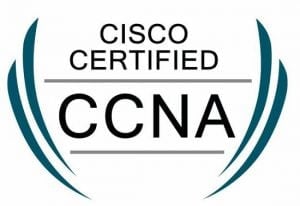Introduction of CISCO
CISCO is the worldwide leader in networking for the public network. The company was founded in 1984 seeking an easier way to connect different types of computer systems. CISCO system is now a multi national corporation, with over 35,000 employees in more than 115 countries. Today, Cisco solutions are for service providers, small to medium business and enterprise customers. Such enterprise customers and businesses are corporations, government agencies, utilities and educational institutions.
What is CCNA ?
CCNA means Cisco certified Network Associate. CCNA is an IT certification from Cisco. CCNA is an associate-level cisco certified certification. Cisco has five levels of career certification. CCNA is the second level of certification from CISCO.  A CCNA certification certifies a technician’s ability to install, set up, configure, troubleshoot and operate a medium-sized computer network. They are also able to implement and verify connections to a wide area network (WAN).
A CCNA certification certifies a technician’s ability to install, set up, configure, troubleshoot and operate a medium-sized computer network. They are also able to implement and verify connections to a wide area network (WAN).
The CCNA certification can be obtained by passing Cisco Exam No.640-802 or by taking two other exams with passing scores: ICND1 No.640-822 and ICND2 No.640-816. This exam tests a candidate’s knowledge and skills required to install, operate, and troubleshoot branch network which is small or medium. The CCNA-certified individual specializes in one of the seven available technology paths:
- Routing and switching
- Network security
- Design
- Service provider
- Voice
- Storage networking
- Wireless.
Colleges and Universities offering Cisco training are members of the Cisco Networking Academy. All specialist certifications are valid for three years. Re-certification requires taking a higher-level exam or retaking the previous exam, as determined by Cisco.
The exam system has changed several times. In 2013, Cisco announced an latest update to its certification. The update has aligned both training curricula and certification with evolving industry job roles. To achieve CCNA certification, one must need a passing score on Cisco exam 200-125, or combined passing scores on both the Interconnecting Cisco Network Devices ICND1 100-105 and ICND2 200-105 exams. The broad sets of topics covered under CCNA certification include:
- WAN and LAN design
- IP addressing
- OSI models
- Routers / routing protocols (includes EIGRP, RIP and OSPF)
- VLAN and WLAN
- Network security and management (ACL included)
The CCNA networking solution connects people, computing devices and computer networks. It allows people to access or transfer information without regard to differences in time, place or type of computer system.
Benefits of CCNA certification
CCNA is always worthy. You must earn up to date CCNA certificate. Then only, you can take CCNP related exams and get certified. Obtaining CCNA builds the possibility of obtaining the CCNP. If you can pass the CCNA, that means you are qualified for applying CCNP. However, CCNA is an associate level certificate and one is recommended to pursue CCNP or any other higher level certificates for career enhancement.The CCNA certificate builds and grows the chances of getting a job in networking area too.
The average salary for the Network Engineer (entry level) in the United States is $67,297. The result is the updated result of 2018. Networking Engineering is a highly specialized career field in United States.The job market DOES NOT require a college diploma but they prefer CCNA certification as a basic requirement. The scenario describes how important is CCNA certification. Some listed benefits are below :
- Familiarity with handling CISCO routers and switches.
- Ability to configure, verify, and troubleshoot Cisco devices.
- Quality job at giant companies having a high payroll.
- Career opportunities as a network administrator, technical support engineer.
- Unlocks necessary skills required to identify network security threats and ways to mitigate them.
- Develops professionalism and boost confidence.
- Availability of part-time jobs is a huge plus-point.
Minimum requirements for CCNA Certification
Even though there are no special requirements from Cisco’s end, the CCNA exam (200-125) may be better suited to those with one to two years of networking experience. Those who wants to take the exam without any hands-on experience; they will only need to work harder and use the tools available. You should not be discouraged at all.
We will discuss in a later section about the paths to achieve the CCNA certification. Candidates without networking experience may first take the ICND1 exam and then the ICND2 exam to become CCNA-certified.
CCNA Certification and skill sets.
The skill sets and key knowledge areas covered by the CCNA certification exam include the following. Cisco Certified Network Associates can :
- Understand how different network unions interact to form a secure IT network
- Configure, verify and troubleshoot a switch with VLAN & interswitch communications
- Explain how a computer network works and how it interacts with networked devices
- Configure, verify and troubleshoot routing and router operations on current Cisco devices
- Implement an IP addressing scheme and IP Services to meet specific network requirements
- Identify network security threats and describe threat mitigation methods & countermeasures
- Setup and verify WAN links and execute the proper methods for connecting to a wide area network
- Describe and perform the appropriate tasks for wireless local area network (WLAN) administration
- Implement & support Network Address Translation (NAT) and Access Control Lists (ACLs) in branch office networks
How to get CCNA certified ?
To become CCNA certified,You have two testing options :
1) Take the inclusive CCNA combo exam
2)Take ICND1 (CCENT) and ICND2 individually. The test versions released on 2016 are below.
- Pass one CCNA Composite exam (currently 200-125)
- Pass two individual ICND exams (currently ICND1 100-105 and ICND2 200-105). In effect, 200-125 = 100-105 + 200-105
The question becomes: “Which route should I take?” The answer to this completely depends on your circumstances. If you have some networking experience or are on a tight schedule to become CCNA-certified, you can go for the CCNA Composite exam.
CCNA Exam Format:
Cisco certification exams are composed of multiple testing formats which includes multiple choice, drag-and-drop, fill-in-the-blank, testlet, simlet, and simulations. You can get more information about the exam format from Cisco Certification Exam Tutorial which is designed by Cisco.com to familiarize yourself with these unique question types.
Time Limit of CCNA : 200-125 (ICND1 & ICND2) / 90 minutes long.
Exam Length: 200-125 (ICND1 & ICND2) contains 60-70 questions.
Passing Score: Approximately 75% score is needed. The exam passing scores are not published by CISCO because
test questions and passing scores are subjected to change by CISCO anytime without any prior notice. (Source: Cisco.com)
The fees for the exam is defined by CISCO.
Conclusion
In this article, we covered at how to become CCNA-certified. We have discussed about CISCO, CCNA benefits of CCNA certification , minimum requirements and skill sets. The total duration it may take to study for the exam can be anywhere between three and 12 months or more.
CCNA Certification in Nepal
There are many institutes in Nepal which provide CCNA Certification. As Broadway Infosys being one of them, You can get CCNA certification in Nepal with jobs and internships opportunities from Broadway Infosys.







